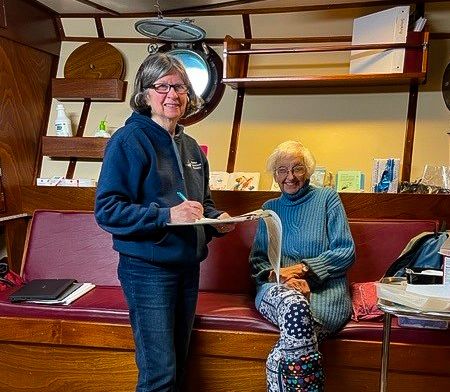
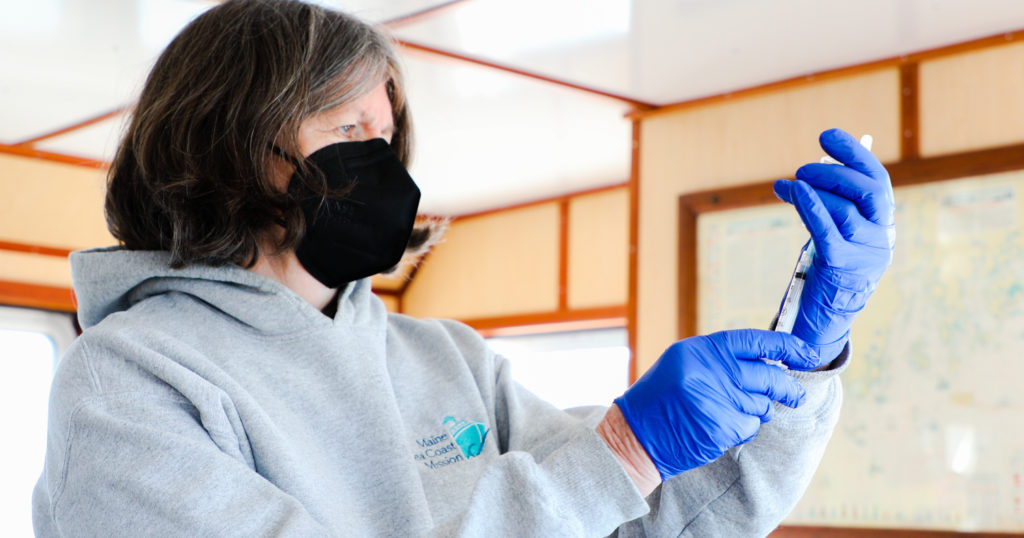
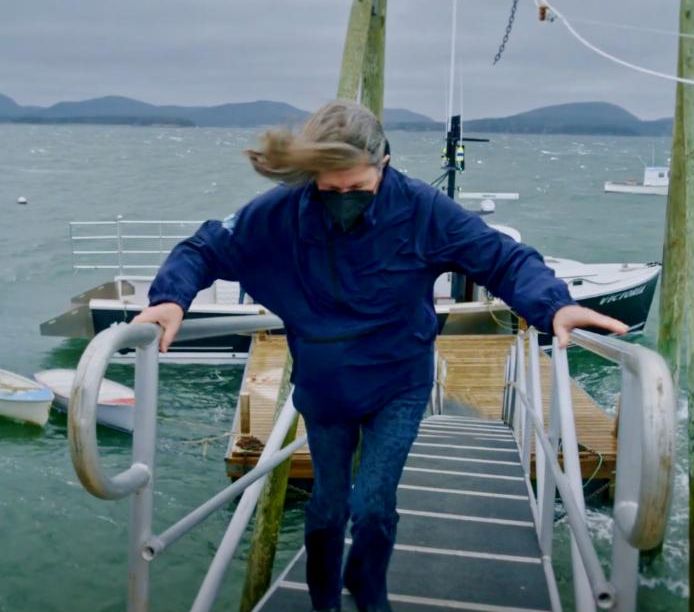
In her time at the Maine Seacoast Mission, Sharon Daley’s work as the Director of Island Health has landed her in the pages of The Washington Post and Newsweek, and on TV in a national Walgreens ad. But to the islanders she serves, Sharon is just Sharon: a confidante, friend, a fellow islander, and someone they can trust. Sharon is retiring after 22 years at the Mission at the end of the year.
Mission President John Zavodny says, “Sharon Daley has made her mark on both the islands and the Mission. She has always provided a high level of health care and personal support and she does it a perfect blend of candor, compassion, and smarts. Speaking of leaving a mark, Sharon gives a pain-free shot. Ask anyone who has been vaccinated by her.”
Sharon says she is most proud of the connection she formed with the islanders. When she started with the Mission, she knew Sunbeam’s reputation within the island community, and being a member of the crew, meant people were more likely to trust her. Sharon came aboard the Sunbeam in 2000 to start the telemedicine program at the Mission. Sharon was tasked with connecting the islands to mainland hospitals and clinics through new telemedicine equipment.
Michael Johnson, the Sunbeam’s Captain, who started the same day as Sharon as the Sunbeam’s engineer (though she was hired five minutes earlier, as she likes to point out), worked with her to get the telemedicine equipment up and running. “She was struggling with the technology of it, and I was new on the boat and wanted to help her. Between the two of us, we kind of figured out the whole telemedicine thing in the beginning. When you are out on an island there is no tech support, there is no IT person that can come, so you are basically winging it. That was her signature program in the beginning.”
Reflecting on her time with the Mission, Sharon shares, “I didn’t start at the Mission with pre-conceived notions of the work needing to be done. I went in looking for the needs that existed. The Mission has always allowed me to do that.” What started as telehealth morphed into home visits because some people were homebound. She says, “We started with primary care, but it became clear there was a need for behavioral health.” Once telehealth services were in place, she recognized people couldn’t easily get blood work due to challenges of getting on and off island. “The Mission integrated lab draws into the Island Health program, and then the need for flu shots came up. So, we started doing that. Then we started a WIC program.” Sharon’s role evolved as more needs were uncovered. While many aspects of delivering healthcare are different than on the mainland, Sharon’s commitment to her patients and the islands has never wavered. She continued to learn and adapted to the changes that come with living on an island.
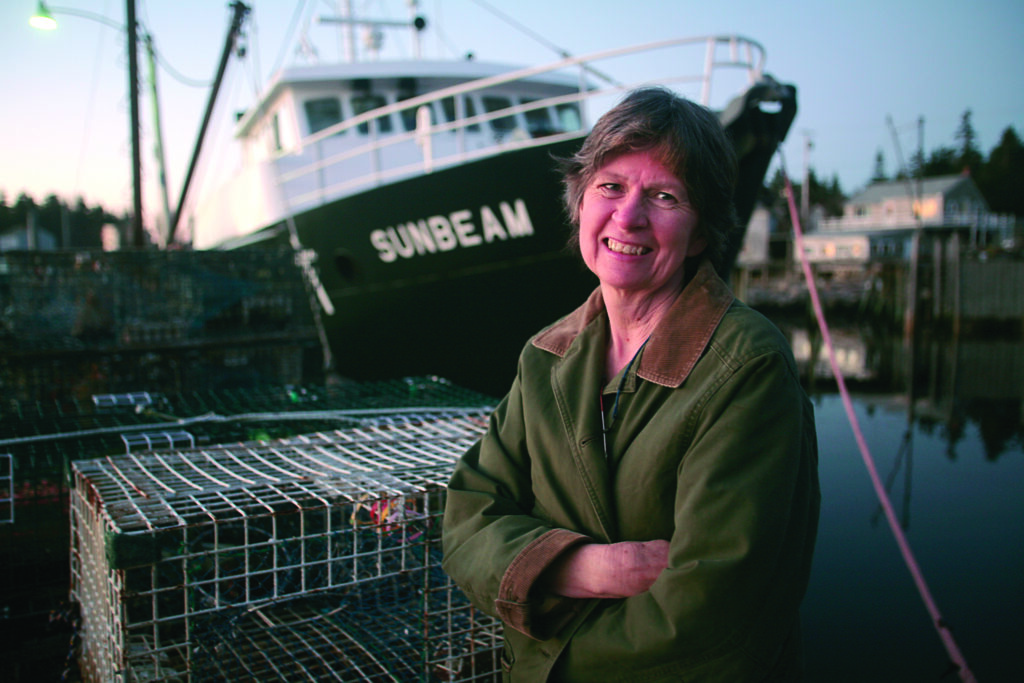
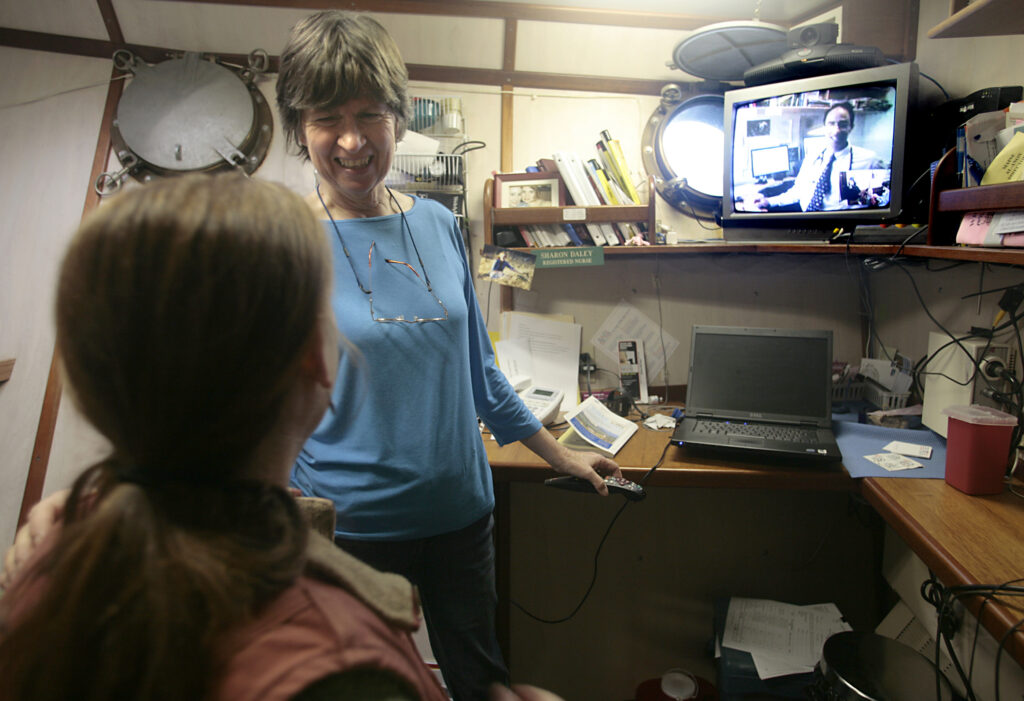
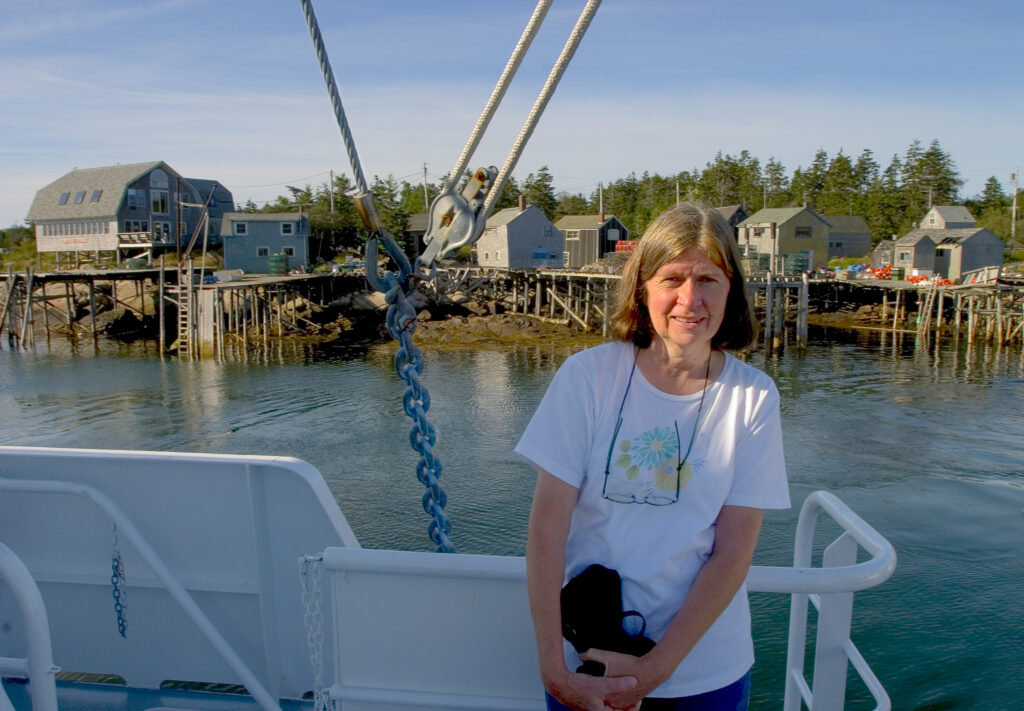
“She really cares deeply about people, how they are doing, and what they are doing. She works with them so that they can be healthy, happy, and content,” says Douglas Cornman, Director of Island Outreach. “She does this tirelessly. I have never seen Sharon say no when someone needs her help or her guidance.” Mike shares that Sharon’s job truly is 24/7 and that she will always answer a call from a patient, even in the middle of the night. The relationships she has built with islanders means many come to her in their toughest moments. “They know that someone cares for them, looking out for them, even when they don’t want to hear what she has to say,” Douglas says. “She will tell you the hard stuff, but she does it in a way that people know she has their best interest in mind.”
Over the years, Sharon has focused on all aspects of living and aging on an island. Part of her work was founding and facilitating the Island Eldercare Network. The network brings together island residents and healthcare providers who work with elders on the islands to share resources, network, and continue to aid those who wish to stay on island. When Sharon saw there was a need to connect islanders with mental health resources, she contacted local providers and facilitated telemedicine visits on the Sunbeam. As people struggled with addiction, she was instrumental in getting Narcan stations set up and connecting island residents to AA meetings. When the Covid pandemic struck, Sharon worked with the Maine Center for Disease Control to ensure islanders had access to vaccinations work later featured in newspapers across the country. The national attention never changed her dedication to the work she did or how she approached it.
Two nurses who have worked with her over the years on the Sunbeam, Maureen Giffin, RN, and Peggy Akers, RN, both say Sharon formed relationships most nurses do not get to have with their patients. “Because of her longevity and ability to build relationships, she has been a trusted person islanders confide in. She made the time to sit down with people and be a listening board. Whatever they were going through whether it is a loss in their families or trauma, she was there.” Maureen says, “She’s been on the islands for so long that she’s seen babies born and grow up. These are people she sees coming to clinics and during the holidays.” Peggy adds, “You don’t often get to be an integral part of someone’s life journey. But in her role, she has. She has built connections with people. She’s the epitome of everything that is good about nursing! “
Douglas and Mike both say that they will miss Sharon’s humor aboard the Sunbeam, her ability to add levity to their time on the boat and how deeply she cared for the crew that she worked with. They shared stories of the way she put people at ease and showed up for both the crew and her patients time after time. Sharon herself says, “The Sunbeam family is a boat family. We get to be a part of the community. We’re a part of the islands’ family. We’re a safe space, a respite. We’ll be on island and say, ‘Ok, I’m going to go home,’ and we’re talking about the boat. We have learned to live together, laugh together.”
When asked what she’s most proud of in her tenure with the Mission, she points to the Covid clinics, but also to her relationships with the people who call the islands home. “If someone is having a problem, I want to know it and sometimes that means being available on nights and weekends. Helping people transition throughout their lives is meaningful in their lives and for me. Be it setting up hospice care or working with agencies to assist in providing services, having a relationship with a patient requires their trust. That has been most rewarding.”
